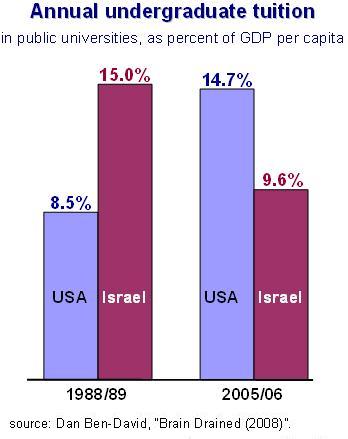|
PDF file
published
in Haaretz on April 13, 2008.
The Third Tuition Option
by Dan Ben-David Should we raise or lower tuition in
the Israel’s public universities? The
fact that there are valid arguments made at both ends of the polarized spectrum
has not proven very conducive for solving one of the most serious problems
currently deeping the country’s academic crisis. But there is a third tuition option for
solving this issue, an option that connects between the compelling facts
underlying the two opposing positions and brings them together with additional
elements barely visible on today’s public radar. Twenty years ago, undergraduate
tuition at public American universities was 8.5 percent of U.S. GDP per capita (the
common measure for living standards). In
Israel, undergraduate tuition reached 15 percent of the country’s GDP per
capita. Since then, the two countries
switched places. In the 2005/2006
academic year, the ratio of tuition to GDP per capita rose to 14.7 percent in
the States and it fell to 9.6 percent in Israel. When this is the only vantage point
that one takes on this issue, it is not hard to understand the insistence by
some that Israeli tuition fees be raised.
In addition, the probability that a university graduate will find
employment is higher than that of a high school graduate, while the salaries of
individuals with BAs are higher as well.
Hence, it is only fair that students be required to finance their
education. On the other hand, the higher the
share of college graduates in the population, the greater the national ability
to assimilate, utilize and develop new technologies and managerial abilities –
a benefit for the entire society, including those who never stepped foot inside
a university. Therefore, there is
justification for society to participate in funding academic studies (this does
not even take into account the fact that a large part of academia’s cost is the
funding of basic research). But the Israeli scene is unique in
additional realms as well. Part of the
country’s population loses years of market income as a result of mandatory
military service. Furthermore, the older
a person is when beginning academic studies, the greater the personal
obligations and responsibilities, compared with those borne by the much younger
American undergrads. And there is an
additional detail that should be taken into account: Israel subsidizes the
studies of Jews who choose not to serve their country – including those among the
ultra-orthodox who also choose not to work. Consequently, the third option for
solving the tuition issue merges a number of national priorities. It is in our interest to draw closer to the
Israeli narrative two segments of the population that will become a majority in
one generation. It is vital that we stop
discriminating for and against (depending on who, and depending on the issue) ultra-orthodox
and Arab Israelis, and begin providing equal rights alongside the requirement
of equal obligations. Just as the Americans enacted the GI
bill after World War II in order to assist demobilized veterans receive an
academic education, Israel should behave similarly towards those who sacrifice
years of their lives in the service of their country. Every healthy Jew that serves three years of
military service and every Israeli Arab that does three years of national
civilian service – even in his/her own community – or military service, should
be eligible for reduced tuition and for non-interest bearing loans that cover
tuition and subsistence for the duration of the studies. Every healthy individual who does not
serve his/her country should not receive any public support whatsoever for any
sort of studies after the age of 18. These
individuals should pay the full price of universities, yeshivot or any other
institution that they wish to study in. Moreover, it is important to utilize
the fact that Israeli universities are among the best in the world and academic
studies in fields like management, economics, computer science, engineering, medicine
and so on should be opened to foreign students who will pay much higher tuition
than Israelis, but lower in comparison with universities of a similar caliber
abroad. Since it is difficult to
exaggerate the importance of being able to read and express oneself in English in
these fields, Israeli students will graduate more prepared into a globalized
marketplace while many foreigners will return home with a new familiarization
of a young, vibrant and humane Israel that is not usually visible in the
international media. The problem is that even if this third
tuition option is equitable and reasonable, it has no chance of ever passing in
our current system of government. The
inherent structural instability, the incentives for supporting sectoral rather
than national priorities, the systemic inducements that spur cabinet ministers
to work only for themselves and against the prime minister (without relation to
any particular individual who may happen to hold the post at any given time) –
all of these prevent Israeli governments from putting forth and adopting long-term
strategies in many different areas, including some that are existential. comments
to:
danib@post.tau.ac.il
|
